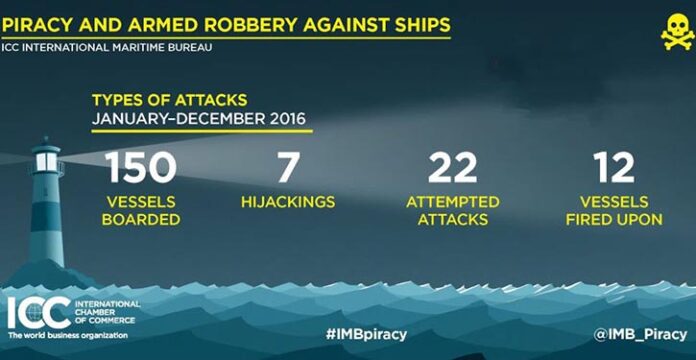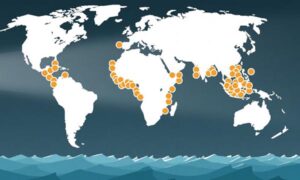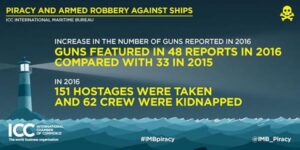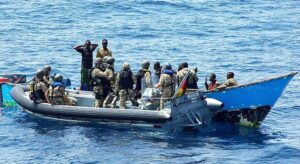
Certain shipping routes still dangerous
“The continued fall in piracy is good news, but certain shipping routes remain dangerous, and the escalation of crew kidnapping is a worrying trend in some emerging areas,” said Pottengal Mukundan, Director of IMB whose Piracy Reporting Centre (PRC) has monitored world piracy since 1991.
The ICC International Maritime Bureau (IMB) is a specialized division of the International Chamber Of Commerce (ICC). The IMB is a non-profit making organization, established in 1981 to act as a focal point in the fight against all types of maritime crime and malpractice. The IMB has a MOU with the World Customs Organization (WCO) and has observer status with Interpol (ICPO).

A total of 191 incidents of piracy and armed robbery against ships have been reported to the IMB PRC in 2016. This is the lowest annual figure since 1998 when 202 incidents were recorded globally, but the number of crew kidnapped in 2016 was the highest in ten years. The 2016 attacks are broken down as 150 vessels boarded, 22 attempted attacks, 12 vessels fired upon and seven vessels hijacked. A total of 151 crew were taken hostage and 62 kidnapped from their vessels in 15 separate incidents – compared to 19 crew kidnapped from five incidents in 2015.
Some regions are dangerous
An emerging threat to merchant shipping is in the Sulu Seas where 12 crews have been kidnapped from two general cargo vessels underway and also an anchored fishing vessel in the last quarter. Crews had previously been kidnapped from “slow and low” moving tugs and barges in three separate incidents in the first half of 2016. This marks a worrying escalation of crew kidnappings in this area.

The Gulf of Guinea remains a kidnap hotspot with 34 crews taken in nine separate incidents in 2016. Three vessels were hijacked in the Gulf of Guinea in 2016. There has been a noticeable increase in the number of reported incidents off Nigeria with 36 in 2016 compared to 14 in 2015. Nine of the 12 vessels fired upon occurred in Nigeria in 2016 – with a number almost 100nm from the coastline. Conversely there has been a noticeable reduction in the number attributed to Indonesia down from 108 in 2015 to 49 in 2016. Although the overwhelming majority of these are low level thefts, vessels were successfully boarded in all but three of the incidents.

Two incidents were recorded off Somalia. The first was an attempted attack on a container vessel in the Gulf of Aden in May. A product tanker was also fired upon in the Somali basin some 300 nm from shore in October. Whilst the latter remains an isolated event, it demonstrates that the capacity and intent to attack merchant shipping there still exists. Vessel masters are therefore urged to maintain high levels of vigilance when transiting the high risk area and to adhere to the latest version of the best management practices.
Peru recorded 11 incidents – with ten of these at the country’s main port of Callao – compared to zero in 2015. The number of incidents in Vung Tau, Vietnam, have dropped from 15 in 2015 to seven in 2016. Bangladesh also witnessed a welcome decrease down from 11 in 2015 to three in 2016.
The IMB PRC remains the world’s only independent 24-hour manned centre to receive reports of pirate attacks from around the world. IMB strongly urges all shipmasters and owners to report all actual, attempted and suspected piracy and armed robbery incidents to the IMB PRC.
This first step in the response chain is vital to ensuring that adequate resources are allocated by authorities to tackle piracy. Transparent statistics from an independent, non-political, international organization can act as a catalyst to achieve this goal.



